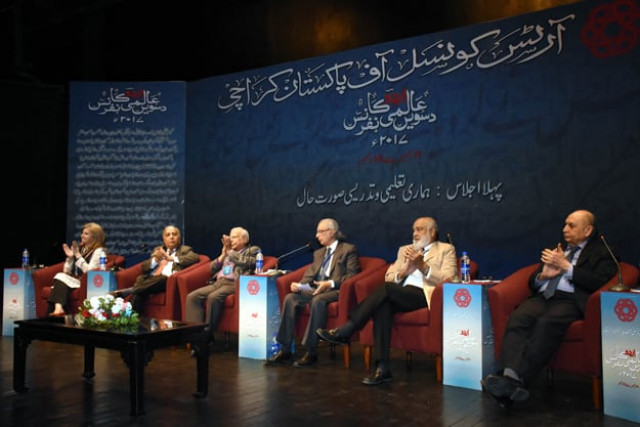‘Fiction is the voice of society’
Literati discuss critical thought in Urdu literature as Urdu conference draws to a close

Fiction is the voice of society and facts are expressed through language, proclaimed Indian scholar Prof Shafey Kidwai at the 13th International Urdu Conference.
As the conference, organised by the Arts Council of Pakistan, Karachi, came to a close on Sunday, Kidwai was addressing a session titled 'A Hundred Years of Urdu Criticism and Research.'
During the discussion, Arts Council president Ahmed Shah came on stage and specially thanked Indian scholar Prof Shafey Kidwai, explaining that though all arrangements for his arrival in Karachi were completed, he was forced to speak online from India due to the ongoing pandemic.
Shah expressed the hope that the coronavirus pandemic would end soon and next year the conference may be held in person as it has been in the past, allowing people to sit together and discuss different viewpoints on the fine arts.
Addressing the participants, Kidwai said knowledge is neither the legacy of East nor the West. Hence knowledge should be acquired from wherever it is available, he said, adding that literature borrows from a society's cultural attitudes and values to reveal inner truths about people and serves as a mirror.
"Fiction is considered the voice of society and facts are expressed through language," he said, adding that the truth always comes out. He added that there were very good writers in Pakistan and this tradition was continuing.
Joining in from Lahore, the great novelist Hamida Shaheen, speaking about criticism and cultural standards, said a new civilization means Western civilization but the soul does not immediately accept the foreign touch so cultural values are resorted to.
She added that our writers should evaluate whether the role they play is in line with the national standard or not. "Saleem Ahmed has spoken of eternal values in literature while Dr Jameel Jalibi says we need to identify ourselves at every level of life," she stated.
Civilization is needed, she went on, adding that the literature of any language can be easily understood in its cultural context. Literature also plays a transformative role for civilizations. If a society is formed by Iqbal, then Iqbal is also forming a society, for instance.
"At present, there is an intellectual traffic jam in which it is difficult for friends to reach the destination," explained Shaheen. "Thick and weighty reforms are raining down like bullets and that perplexes readers."
Commenting on the topic of modern critical thought and Urdu fiction, Qazi Abid said that Urdu fiction means fiction.
He spoke on the various forms of fiction, mentioning that in the West, films are also included in the category while Urdu fiction primarily incorporates novels and dramas.
According to him, in every form of fiction, be it the stage or the cinema, the author's voice looms over the material but the text has the ability to reveal all its possible meanings. Referring to what the reader brings to the table, he said that the reader is more astute than the writer as the reader has their own understanding that they bring while the writer has only the one text.
Besides, he discussed critical tendencies expressed around the 1990s.
The speakers discussed the dearth of introductory materials for Urdu texts and possibilities for criticism for Urdu literature, which differs from the West.
Published in The Express Tribune, December 7th, 2020.



















COMMENTS
Comments are moderated and generally will be posted if they are on-topic and not abusive.
For more information, please see our Comments FAQ